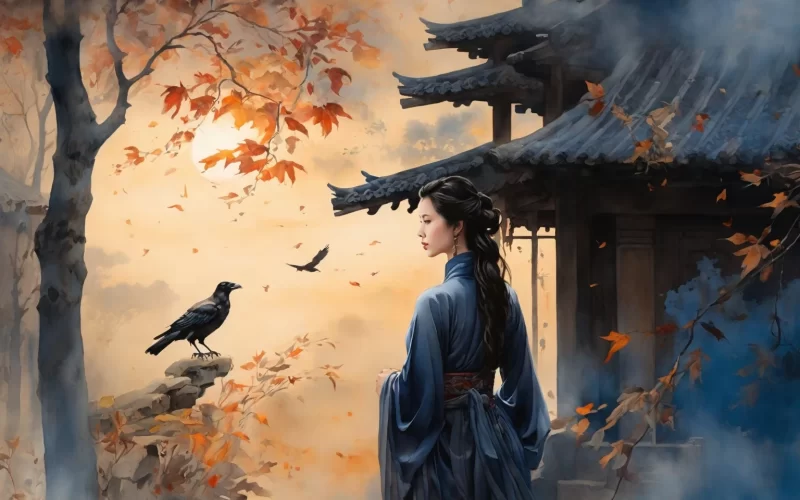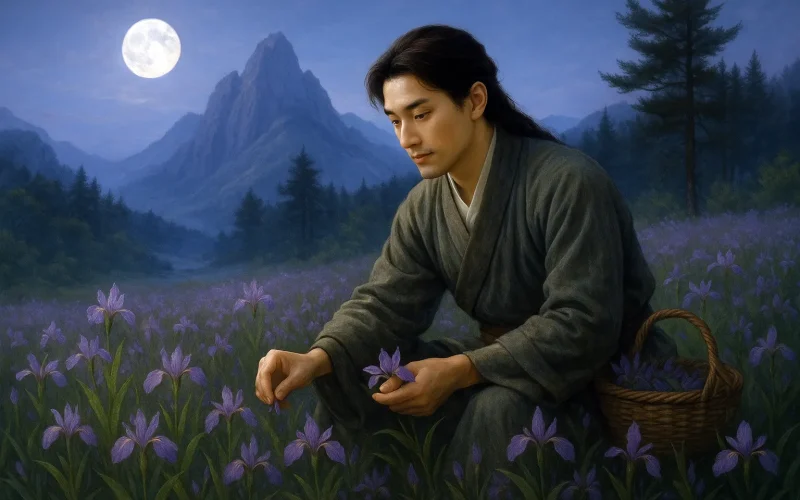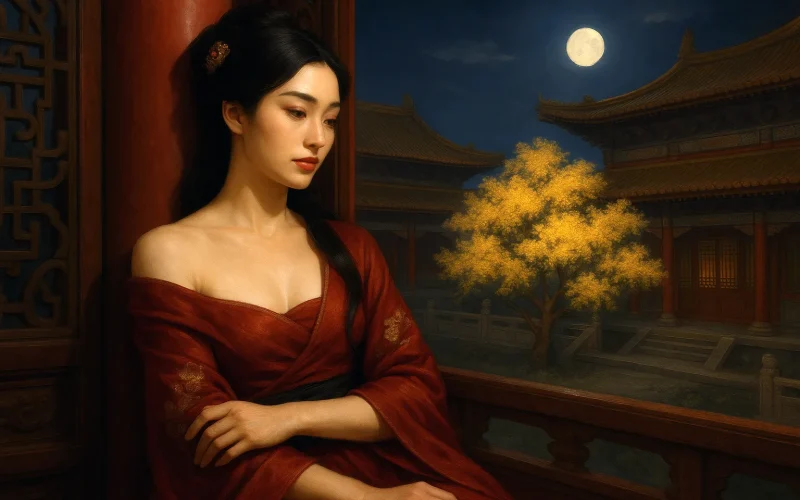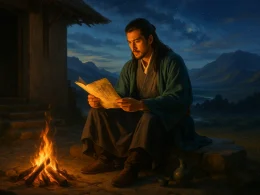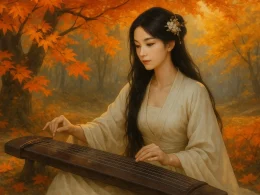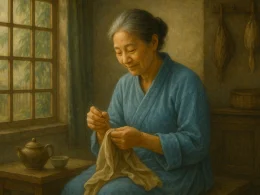The clouds hang low when crows on city walls cry;
Back they fly, cawing at dusk from tree to tree.
On the loom weaves the wife of the roving guy;
She stops her shuttle at the crows’ cawing sadly.
She thinks of her husband so far, so far away,
In her lonely room she can’t but weep till the day.
Original Poem
「乌夜啼」
李白
黄云城边乌欲栖,归飞哑哑枝上啼。
机中织锦秦川女,碧纱如烟隔窗语。
停梭怅然忆远人,独宿孤房泪如雨。
Interpretation
This poem represents Li Bai's masterful reinterpretation of the ancient Yuefu ballad "Crows Returning at Dusk." While preserving the original theme of separation and longing, Li Bai elevates it with his genius touch. By capturing the emotional eruption of a Qin River weaver girl triggered by specific moments (dusk) and imagery (crow calls), the poem not only expresses a woman's longing but also reflects the widespread suffering inflicted on ordinary families by frontier conflicts during the High Tang period, bearing profound temporal significance.
First Couplet: "黄云城边乌欲栖,归飞哑哑枝上啼。"
Huáng yún chéng biān wū yù qī, guī fēi yāyā zhī shàng tí.
Yellow clouds hang low by city walls, crows seeking rest; Returning with caw-caw cries, perched on branches.
The opening immerses readers in an emotionally charged atmosphere through color and sound. "Yellow clouds" describe both the dusk sky and create an oppressive, gloomy mood. "Crows seeking rest" uses the birds' natural homing instinct to contrast with the human's inability to return home. Their "caw-caw cries" sound particularly jarring against the bleak backdrop, serving not just as environmental sound but as the externalization of the protagonist's restless feelings, successfully establishing a sorrowful tone.
Second Couplet: "机中织锦秦川女,碧纱如烟隔窗语。"
Jī zhōng zhījǐn Qínchuān nǚ, bì shā rú yān gé chuāng yǔ.
At her loom weaves the Qin River maid; Behind smoke-like green silk, murmurs drift through windows.
The focus shifts from exterior to interior as the protagonist appears. "Weaving brocade" identifies her occupation and suggests diligence and loneliness. "Qin River maid" represents countless women awaiting expeditionary men in the Guanzhong region. "Smoke-like green silk" creates aesthetic distance and hazy beauty, making her image dreamlike. "Murmurs through windows" adds mystery—are these involuntary whispers or wordless dialogues with the crows outside? The line's subtlety invites endless imagination.
Third Couplet: "停梭怅然忆远人,独宿孤房泪如雨。"
Tíng suō chàngrán yì yuǎn rén, dú sù gū fáng lèi rú yǔ.
Shuttle stilled, she wistfully recalls her distant man; Alone in her lonely room, tears fall like rain.
This couplet marks the emotional climax, moving from external action to inner world. "Stilled shuttle" is a highly pregnant action—the abrupt cessation when emotions become unbearable, proving labor cannot dispel sorrow. "Wistfully" captures her emptiness, loss, and helplessness. Finally, all emotions erupt into "tears like rain," a hyperbolic yet vivid metaphor that thoroughly releases her inner agony and despair with strong visual and emotional impact.
Holistic Appreciation
This poem exemplifies "instant narrative" artistry. Capturing the brief moment from dusk crow calls to night tears, it reveals the complete psychological journey from daily labor to emotional collapse. The structure follows a progressive pattern: "external scene (crow calls) → interior scene (weaver girl) → action (stilled shuttle) → emotion (recalling, tears)," moving from object to person, surface to depth, culminating in emotional climax. With concise language, Li Bai creates a vivid, authentic, intensely emotional female figure who becomes the tragic epitome of countless expeditionary wives in ancient wartime contexts.
Artistic Merits
- Exemplary Environmental Evocation: The poem begins with mournful imagery ("yellow clouds," "returning crows") to successfully create a melancholy atmosphere where sorrow permeates before being directly stated.
- Expressive Power of Detail: The "stilled shuttle" detail speaks volumes, precisely revealing the critical point from endurance to collapse, serving as the poem's emotional pivot.
- Progressive Emotional Expression: The emotional expression moves from subtle (window murmurs) to direct (recalling the distant man) to unrestrained (tears like rain), with clear layers and strong dramatic effect.
- Yuefu Folk Song Style Elevated: The plain, natural language carries folk song freshness, yet the conception and emotional depth far surpass ordinary folk songs, reflecting literati poetry's refinement and elevation.
Insights
This poem deeply conveys how behind grand historical narratives lie individuals' inexpressible pain and endless waiting. Li Bai's brush penetrates an ordinary woman's heart, allowing later generations to see how war involves not just frontline battles but also countless "lonely room" tears flowing silently at the rear. It reminds us that historical attention should focus not only on heroes and battles but also on the joys and sorrows of individuals swept up by historical tides. In contemporary society, though ancient-style warfare may not exist, various forms of "separation" and "waiting" persist—this poem inspires us to offer deeper understanding and care to hearts bearing longing and loneliness.
About the poet

Li Bai (李白), 701 - 762 A.D., whose ancestral home was in Gansu, was preceded by Li Guang, a general of the Han Dynasty. Tang poetry is one of the brightest constellations in the history of Chinese literature, and one of the brightest stars is Li Bai.






